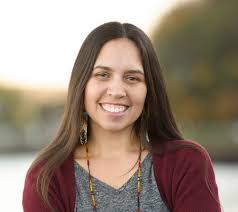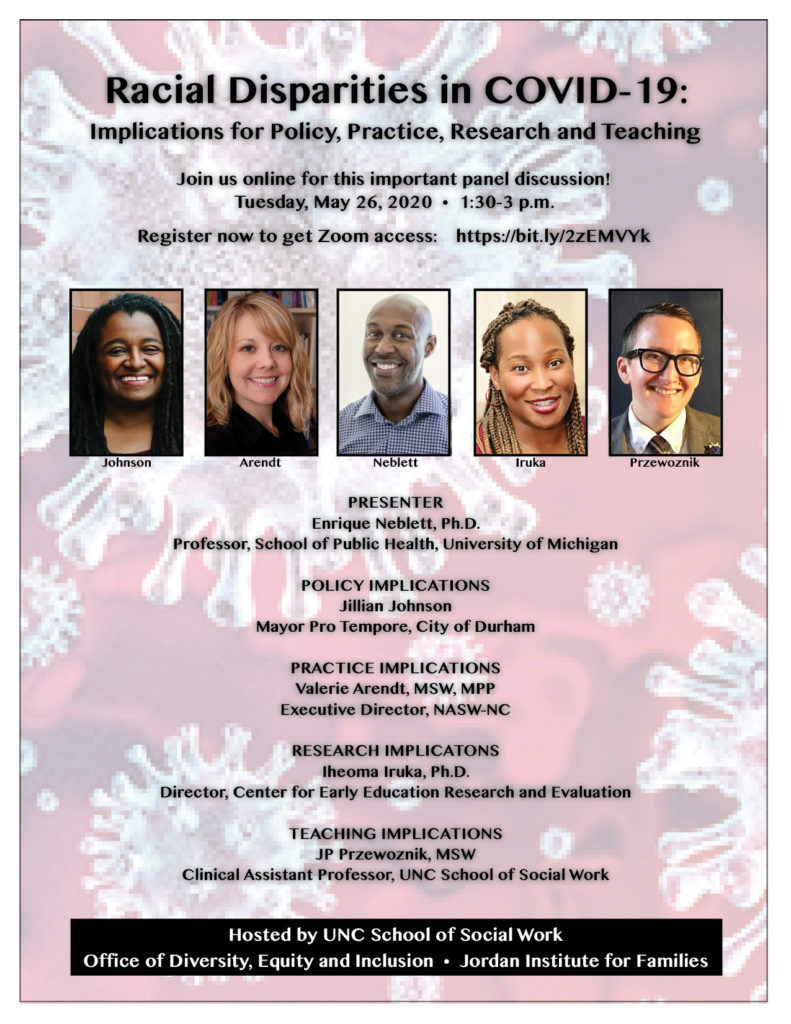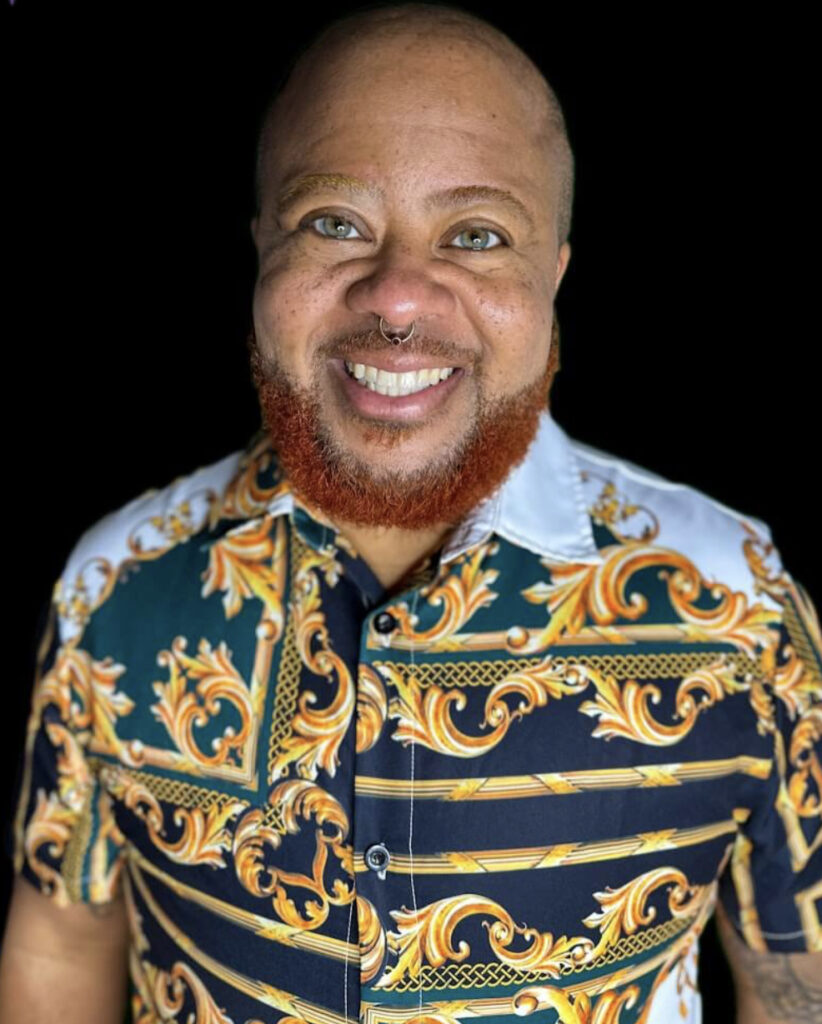Over the past week, there have been many important resources shared within the School of Social Work. These include a webinar, suggestions via the school listserv and more. This post is meant to organize some of these resources with gratitude to all who shared them. More will follow. We acknowledge that the news about the impact of the COVID-19 virus and police brutality on people of color is not at all new. This country has been in a crisis – a pandemic caused by racism – since its inception. As we work to stand forward, people who are white in particular need to see the unseen so they can act in new ways. These resources are a small start.
On May 26, 2020 the Jordan Institute for Families partnered with the UNC School of Social Work’s Office of Diversity, Equity and Inclusion to host a webinar titled: Racial Disparities in COVID-19: Implications for Policy, Practice, Research and Teaching. The presenter was Dr. Enrique Neblett, Professor, School of Public Health, University of Michigan. Panelists included Jillian Johnson, Mayor Pro Tempore, City of Durham, NC, Valerie Arendt, Executive Director NASW-NC, Dr. Iheoma Iruka, Director, Center for Early Education Research and Evaluation, and JP Przewoznik, Clinical Assistant Professor at the UNC School of Social Work. Click here to watch the video.
The Center for Urban Education at the University of Southern California has developed a webinar series on Racial Equity in Online Environments. All 6 webinars can be viewed for free online here.
Click here to read a piece by Danielle Cadet titled Your Black Colleagues May Look Like They’re OK- Chances are They Aren’t.
Read this powerful piece by Christy Oglesby, a senior producer with CNN, “I need white mamas to come running”.
Read White Caller Crime: Racialized Police Communication and Existing While Black and discuss.
Dr. Giselle Corbie-Smith discusses the overall impact of COVID-19 on Black people’s mental and physical health. Watch the webinar here.
Watch Trevor Noah’s commentary on why the social contract has broken down.
Consider this opinion piece on revisioning of social service and social workers with the money spent on policing.
Suggested Reading List: 1) Oluo, I. So You Want to Talk About Race, 2) Coates, N. Between the World and Me. Spiegel and Grau; 2015. 3) DiAngelo, R. White Fragility. Beacon Press; 2018. 4) Hinton, A. The Sun Does Shine: How I Found Life, Freedom and Justice. St. Martin’s Griffin; 2015. 5) Kendi, I. How to Be an Antiracist. One World; 2019. 6) Metzl, J. Dying of Whiteness: How the Politics of Racial Resentment is Killing America’s Heartland. Basic Books; 2019. 7) Saad, L. Me and White Supremacy – Combat Racism, Change the World and Become a Good Ancestor. Sourcebooks; 2020.
Explore and share the New York Times Magazine’s 1619 Project. This important work explains the truth about our history and its foundation which rests on enslaved people.
The Seven Last Words of the Unarmed – a multi-movement choral work by Joel Thompson. Link is to piece and website with educational resources
War on Black Boys – spoken word piece performed by Kale Newton
Support programs working to end police violence in American. Check out Campaign Zero and Black Lives Matter to get started. Get engaged at Obama.org. There are EXCELLENT resources on this website including the Policing and Civil Rights Toolkit!
These resources were offered by the UNC Office of Diversity, Equity and Inclusion:
- Glossary for Understanding the Dismantling Structural Racism/Promoting Racial Equity Analysis
- Uprooting Racism: How White People Can Work for Racial Justice, Paul Kivel
- Towards the “Other America”: Anti-Racist Resources for White People Taking Action for Black Lives Matter, Chris Crass
- Policing Black Bodies: How Black Lives are Surveilled and How to Work for Change, Angela J. Hattery
 | Listening to Understand and Not to Respond Across Different Cultural Contexts The Maternal Health Learning & Innovation Center’s April webinar was led by Camie Jae Goldhammer, MSW, LICSW, IBCLC (Sisseton-Wahpeton tribe). This webinar describes historical trauma and the historical trauma response related to maternal/child health, unresolved grief, and Native parenting. Watch the recorded webinar |
 | Coming Face to Face with My Biased Self The Maternal Health Learning & Innovation Center’s March webinar was led by Dr. Clifton Kenon, Jr., DNP, RN, IBCLC. This webinar examines personal bias and provides introductory information about implicit bias. Watch the recorded webinar  Cultural Humility and Black Maternal Health in Historical Context This webinar, presented by Dr. Jann Murray-García, MD, MPH as part of the Maternal Health Learning and Innovation Center focuses on understanding the contentious historical context in which Black women in America have nonetheless achieved health, and how that historical context continues to undermine their efforts. This webinar also makes visible the often unspoken social scripts we ascribe to “The Other” and to ourselves, scripts that may negatively impact our encounters. Watch the recorded webinar. |
Join the American Public Health Association for their first webinar in Advancing Racial Equity series providing an in-depth look at racism as a driving force for the social determinants of health and equity. The first webinar will be held on Tuesday June 9th from 2-3:30pm EDT – Racism: The Ultimate Underlying Condition.
Presenters will: identify the multiple levels on which racism operates; describe the physiological impacts of racism and discrimination on health; and explore the principles for and barriers to achieving health equity. REGISTER NOW!
| The Collective Impact Forum offered clear strategies for Ways to Engage Right Now – Each One Counts. Listen. Learn. Give. Center. |
| Listen to communities of color. Understanding what Black, Brown, or Indigenous people need to thrive is crucial right now. Please don’t assume. Ask. Ask them right now what they need from you. Listen. Listen to what your community members say. Trust. Trust what they say is what they need right now. . |
| Learn: If you are struggling with what is said above or what is going on right now in our world, a good step is to visit some resources to support your own learning. Everyone is learning at their own pace. Remember to not expect or task your Black colleagues and community members to teach you right now. They do not have the time or energy to lay things out again. If you are feeling challenged and wondering where to start, seek out resources like the ones listed in this blog. Anti-Racism Resources 75 Things White People Can Do for Racial Justice |
| Follow: There are many excellent organizations leading the field on supporting racial equity. Here are just a few to follow that can support your learning. PolicyLink Philanthropic Initiative for Racial Equity (PRE) Equity in the Center Race Forward. |
| Give: It’s become a pandemic cliché to say “Now more than ever,” but it’s still true. Now, more than ever, giving is essential. Whether it’s giving money, time, or compassion. If you are an individual donor and are able to give: even a small donation can support anti-racist work in your community right now. Showing up to support local Black-run businesses and organizations is also a form of giving. Donating time (even virtually as many of us still shelter in place) can also be helpful. See “Listen” above. If your communities are asking for something to be given, if you can, please give. Give compassion. “Now more than ever” is the time to spread your compassion and empathy. So many are feeling pain, exhaustion, fear, and grief. Your compassion and love can be a real gift. |
| Center: It’s very necessary to center the stories and experiences of Black lives and other people of color, and what they are going through. Center their narratives and what they are experiencing. Use those experiences as a light to guide your actions. Be wary of “easy” narratives that pin blame on communities of color. Like using a stereotype to quickly code someone, narratives are also tools to quickly divide and understand. Parse your media intake- who is being centered? Whose experiences are “the protagonist”? At this time of heightened racial violence and inequity, if the story “protagonist” is not Black or Brown, use that as an indicator to reassess that media source and what narrative they are trying to give you. Our own media literacy (including social media) is a key learning area right now. Following media outlets and sources that are authored by and for Black, Brown, and Indigenous communities is a crucial step to improve one’s own media literacy, especially if you want to unlearn harmful narratives that you may be unknowingly carrying with you. |
| With deep gratitude, Robert Albright, Director, Collective Impact Forum Sheri Brady, Associate Director, Aspen Institute Forum for Community Solutions Jennifer Splansky Juster, Executive Director, Collective Impact Forum Tracy Timmons-Gray, Associate Director, Collective Impact Forum About the Collective Impact Forum The Collective Impact Forum, an initiative of FSG and the Aspen Institute Forum for Community Solutions, is a resource for people and organizations using the collective impact approach to address large-scale social and environmental problems. We aim to increase the effectiveness and adoption of collective impact by providing practitioners with access to the tools, training opportunities, and peer networks they need to be successful in their work. The Collective Impact Forum includes communities of practice, in-person convenings, and an online community and resource center. Learn more and join the community at collectiveimpactforum.org. Have a question or comment about the Forum? Please contact Tracy Timmons-Gray. |

